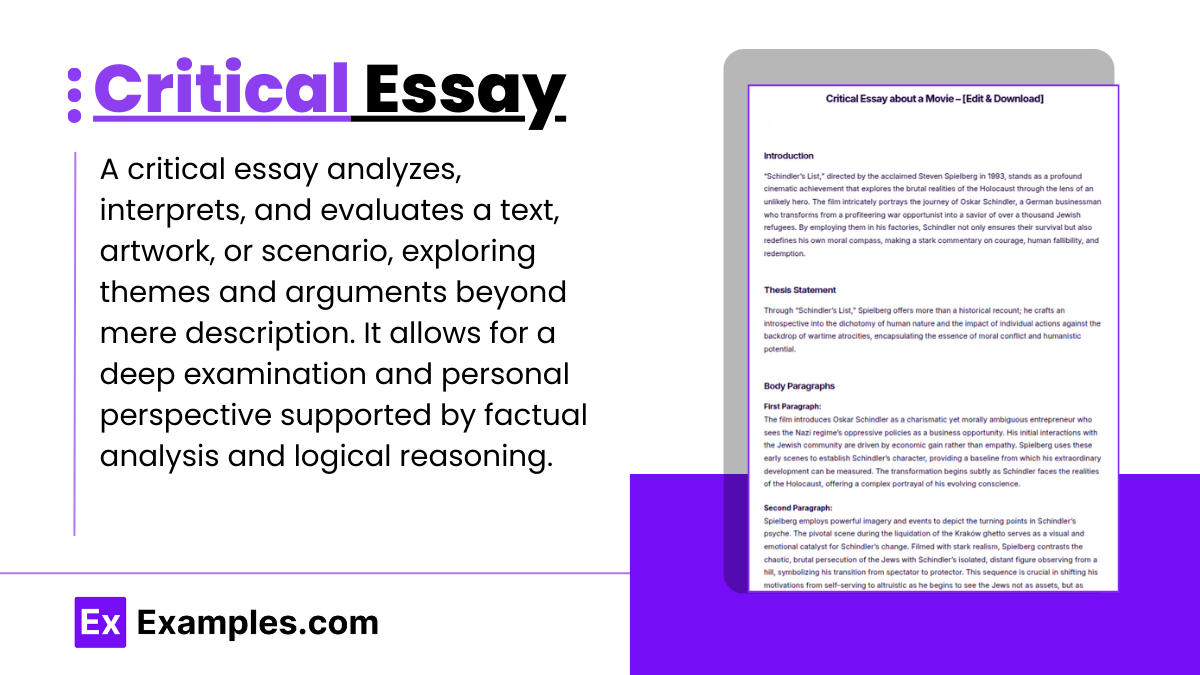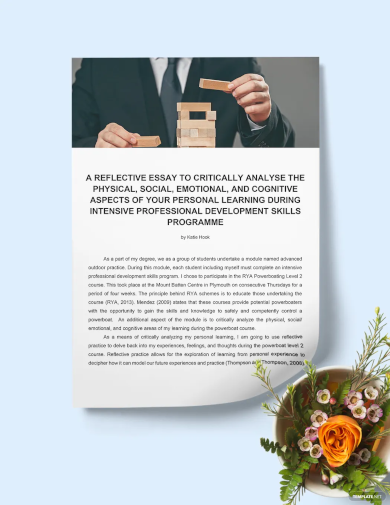11+ Critical Essay Examples to Download
A critical essay is a type of academic writing that requires you to analyze, interpret, and evaluate a text, artwork, political scenario, social phenomenon, or scientific concept. This essay goes beyond mere description; it involves a deep dive into the content, exploring themes, arguments, and the underlying implications. Whether you are dissecting a literary work, critiquing a film, or examining a historical event, a critical essay enables you to express a personal standpoint augmented by facts, analysis, and a reasoned argument.
What is Critical Essay?

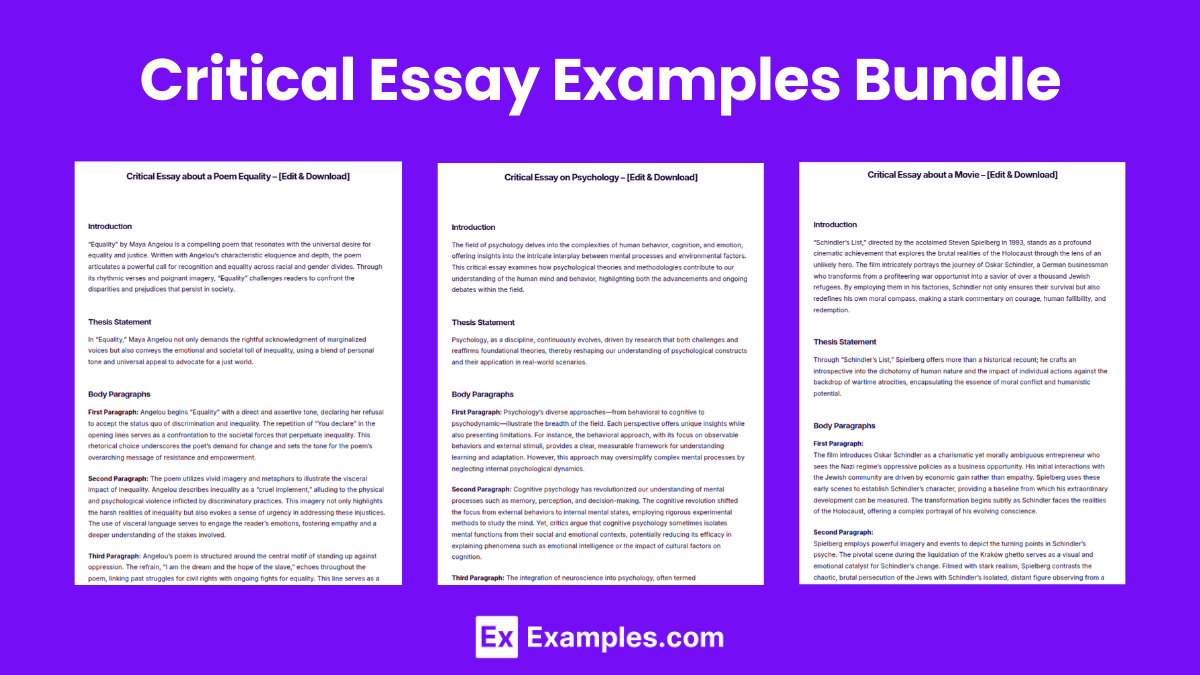
Critical Essay Examples Bundle
Critical Essay Format
Introduction
Begin with an engaging opening that provides context for the text or subject being analyzed. Introduce the work and state your interpretation or perspective without revealing too much of your analysis.
Thesis Statement
Clearly present your main argument or claim about the text. This statement sets the direction for your essay and informs the reader of your evaluative stance.
Body Paragraphs
Devote each paragraph to a specific point that supports your thesis. Start with a clear topic sentence, provide evidence from the text, and include your analysis. Connect your ideas smoothly to ensure the essay flows logically from one paragraph to the next.
Conclusion
Summarize your main points and restate your thesis in a new light, based on the analysis provided. Conclude by reflecting on the broader significance of your critique and its impact on the interpretation of the text.
Critical Essay Example
William Shakespeare’s “Macbeth” is a profound exploration of ambition and its consequences. This tragedy illustrates how ambition can lead to downfall through the character of Macbeth, a noble but flawed hero who succumbs to his desires for power.
In “Macbeth,” Shakespeare uses the character’s rise and fall to critique the destructive nature of ambition, suggesting that it can lead to moral corruption and personal ruin.
The play begins with Macbeth as a celebrated hero, honored by his peers and the king for his bravery in battle. However, the encounter with the witches reveals his inner desire for power as they prophesy that he will become the King of Scotland. This prophecy awakens a latent ambition within Macbeth, serving as the catalyst for his subsequent actions.
As Macbeth’s ambition grows, it begins to overshadow his judgment. Influenced by Lady Macbeth’s manipulation and his own aspirations, he commits regicide by murdering King Duncan. This act of murder is a critical turning point, marking his moral decline. Shakespeare uses this moment to highlight how unchecked ambition can lead one to commit unthinkable crimes.
Following Duncan’s murder, Macbeth descends further into paranoia and tyranny, illustrating the isolating nature of ambition. His reign becomes marked by fear and violence, as he eliminates those he perceives as threats. This erosion of humanity and moral values points to Shakespeare’s caution against the dangers of overreaching ambition.
In “Macbeth,” Shakespeare presents a compelling argument about the perils of ambition. Macbeth’s tragic end serves as a cautionary tale that ambition, when left unchecked, can destroy the individual. Through this narrative, Shakespeare not only critiques the ambitious urges of his characters but also warns his audience of the potential personal costs of such desires
Critical Essay Examples
Critical Essay about a Movie

Critical Essay about a Poem Equality

Critical Essay on Psychology

More Examples on Critical Essay
- Critical Essay for Students
- Short Critical Essay
- Higher Critical Essay
- Film Critical Essay
- Nat 5 Critical Essay
Critical Reflective Essay Template
Critical Essay on Joseph Conrad’s “Heart of Darkness”

Poetry Analysis Essay Template
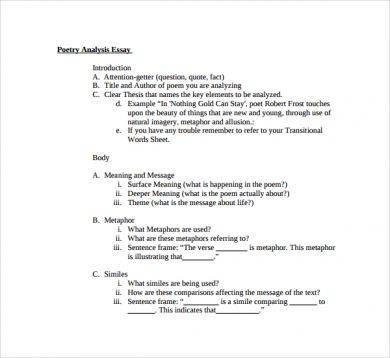
Sample Critical Essay
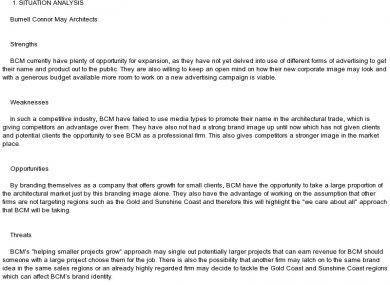
How to Write a Critical Essay
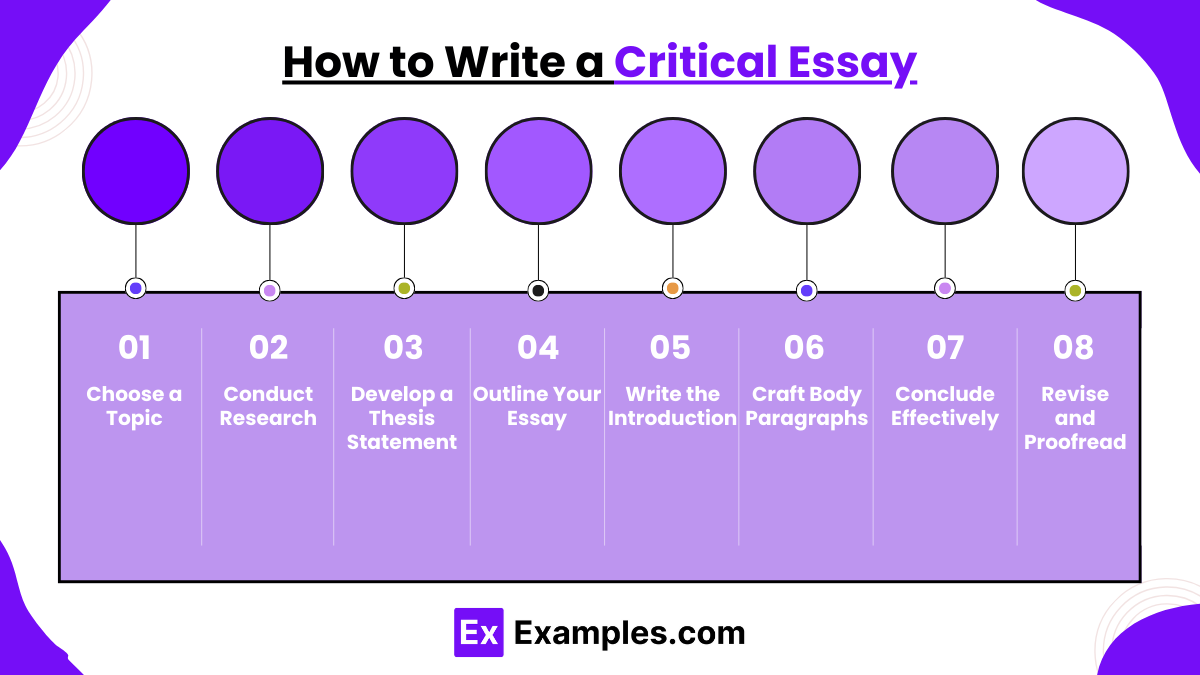
- Choose a Topic: Select a subject or work to analyze. This could be a book, film, article, or artwork. Make sure it’s something that offers enough depth to analyze.
- Conduct Research: Gather information and evidence from the source material and secondary sources if necessary. This might include textual evidence, criticisms, reviews, and theoretical material related to your topic.
- Develop a Thesis Statement: Your thesis is the central argument of your essay. It should state your position clearly and provide a concise summary of what you intend to argue or prove.
- Outline Your Essay: Plan the structure of your essay. Typically, a critical essay includes an introduction, several body paragraphs, and a conclusion. Decide the main points you will discuss in each section.
- Write the Introduction: Start with a hook to engage the reader, introduce the work or topic being analyzed, and end with your thesis statement.
- Craft Body Paragraphs: Each paragraph should focus on a single point that supports your thesis. Begin with a topic sentence, provide analysis and evidence, and connect your discussion back to your thesis.
- Conclude Effectively: Summarize the main points you’ve discussed and restate your thesis in a new light, based on the analysis you’ve provided. Suggest broader implications or end with a thought-provoking question or statement.
- Revise and Proofread: Review your essay for clarity and coherence. Make sure each paragraph flows logically into the next and supports your thesis. Check for grammar and spelling errors, and ensure that all sources are properly cited.
Tips to Remember When Writing a Critical Essay
- Understand the Assignment: Make sure you understand the requirements and expectations of the essay. Know the necessary format, citation style, and the specific question or theme to address.
- Use Critical Thinking: Analyze and evaluate the source material instead of just summarizing it. Focus on interpreting deeper meanings, underlying themes, and significant motifs.
- Support Your Arguments: Use evidence from the source material to back up your claims. This could include quotations, specific details, and references to the text.
- Structure Your Essay Properly: Maintain a clear and logical structure. Organize your essay with a strong introduction, coherent body paragraphs, and a conclusive ending.
- Be Objective: Maintain an academic tone and an objective perspective. Avoid overly emotional language and unsupported statements.
- Revise and Proofread: Always revise your draft to improve the clarity and flow of your arguments. Check for grammar and spelling mistakes and ensure all sources are correctly cited.
FAQs
How do you start a critical essay?
Start with an engaging hook, provide background information on the topic, and end the introduction with a clear thesis statement.
What should be included in the body of a critical essay?
The body should include several paragraphs, each discussing a specific point or argument that supports the thesis, backed by evidence from the source material.
How do you conclude a critical essay?
Summarize the main points, restate the thesis in light of the discussion, and possibly suggest further implications or areas for future research.
What makes a good thesis statement for a critical essay?
A good thesis statement clearly presents the central argument or claim, is debatable, and is supported by the analysis provided in the essay.
How do you cite sources in a critical essay?
Use a consistent citation style (such as MLA, APA, or Chicago) throughout your essay to reference quotes, ideas, or data from other works.


